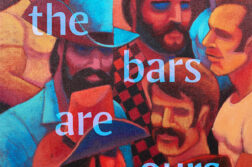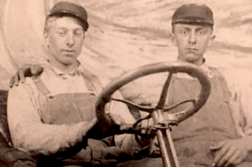The Case Is Far from Closed
HISTORIANS Bill Percy and Lewis Gannett had an article called “Lincoln, Sex, and the Scholars” in The Gay & Lesbian Review last year [March-April 2006]—another part of the ongoing effort by Bill and others to annoy heterosexuals by cheekily suggesting that some American idols were actually on our team. As agitation it’s superb, but by historical standards it’s grade B.
They have no direct evidence, of course: no one in Lincoln’s lifetime seems to have suggested that he had sexual desires for men. What Gannett and Percy have is a lot of circumstantial data, some consisting of Lincoln’s own words, some reports of his nonsexual behavior. They then show, rather like the old projects in Boy’s Life, how you can assemble this evidence to construct a picture that will outrage your uncle Elmer and his whole American Legion chapter. Which is all good wholesome gay amusement, but my training as a historian has led me to worry about what actually happened or didn’t happen, especially when it involves my gay brothers. When it’s a question of interpretation, context is critical.
Percy and Gannett lead with their strongest point, which is incontrovertible: Lincoln did not like women. As a rule, he avoided contact with them when possible; he took no initiative in relationships with women; and he had a spectacularly bad marriage. This being the case, there is every likelihood that at some point in his youth he experimented with sex with other men. But this conclusion is too vague for Gannett and Percy, along with Charley Shively and C.A. Tripp, upon whose research their article rests. They want names and stories, preferably from his adult years, so that they can argue a continuing taste for male-male sex. They don’t get quite as detailed as Shively, who asserted that Lincoln was “clearly an ass rather than a crotch man”; but they try to weave together a number of facts, as Shively did in Drum Beats: Walt Whitman’s Civil War Boy Lovers (1989), to make a gay man’s story. Unfortunately, the facts don’t weave, at least not to anyone familiar with 19th-century America, and they end up instead with a lot of loose fiber.
Take Lincoln’s fondness for dirty jokes. He knew an incredible number of them, and at social gatherings he would entertain other men with them. Percy and Gannett make much of his “sexy wit,” which to them suggests a man eager to talk about sex with other men. But, in fact, this practice wasn’t principally about either sex or wit, but male sociability. Lincoln didn’t make up his sex stories; we have testimony from men who knew him well that he just picked up the best jokes in circulation and passed them on. He was a raconteur, not a wit. And he used them the way a good raconteur uses them: not to express his own interest in sex, not to arouse his listeners, but to get a laugh. As a lawyer and local politician, Lincoln had a métier that depended on sociability with voters and jurymen—exclusively other males. Dirty jokes were, and are, a common coin of male socializing. This pattern is reasonably common now and was equally so in the 19th century. A friend of James Garfield talked of working for a man who told dirty jokes all the time. Telling stories other men enjoy hearing isn’t presumptive evidence of being homosexual.
The authors make much of Lincoln’s telling a friend that sex was “the harp with a thousand strings,” as though he meant to say something about diverse sexual tastes. In point of fact, “the harp with a thousand strings,” a phrase out of an Isaac Watts hymn and easily found in Bartlett’s Familiar Quotations, was one of the favorite clichés of the Victorian era. Watts used it to evoke the complexity and sensitivity of the human body. From there to sex is a short step, which many Americans made. An 1862 letter between two young men in the Berry Family Papers at Cornell University mentions the chance of sex with a girlfriend: “I would make her feel like her ass was a harp with a thousand strings all going at once.” These aggressively straight guys would have agreed with Lincoln’s verdict and understood the phrase as a reference to exquisite pleasure, not a thousand varying techniques.
A poem probably of Lincoln’s composition in his Indiana teenage years supplies more fuel for the authors’ theorizing. It was part of a composition called “The Chronicles of Reuben,” which ridiculed a local family with whom Lincoln was feuding. In it, one of the boys of the family gets rejected by his sweetheart because of his “low crotch” (hernia?) and ends up marrying another boy. The product of their union is an egg that “never will hatch.” This poem, they assert, shows that Lincoln’s “understanding of sex was precocious as well as sophisticated.” But surely this assertion misses the point. The teen-age Lincoln was trying to hold the Grigsbys up to ridicule, in other words, make them look silly in the community’s eyes. To have used kinky or outlandish, or even unusual, examples would have spoiled his purpose. He had to stick to concepts the community understood. If he was “precocious and sophisticated,” so was all of Pigeon Creek—male and female, for the only extant version of the poem came from an old woman who said she heard him recite it.
But the centerpiece of the Gannett-Percy article, at least to the editor of The Gay & Lesbian Review, is the question featured on the cover of that issue: “Why did Abe Lincoln share his bed with men?”—a question that should provoke suspicion in 21st-century readers, whether gay or straight. The short answer is that Lincoln was a 19th-century American man with business interests. For men to share beds in an impersonal, business context was so routine that it raised no eyebrows at the time. Peter Duponceau, who came to America during the Revolutionary War, has an amusing story in his memoirs about a Frenchman who put a sexual interpretation on the practice. Probably the best place to get a complete overview of American men’s sleeping habits in the era before modern conveniences is Michael Quinn’s Same-Sex Relations in 19th-Century America, which focuses on the Mormon West. Among other things, Quinn points out that Mormon district leaders traveling from church to church were expected to sleep with the local church leaders, who relocated their wives for the night. The purpose was a thorough review of local church problems; business trumped marital relations.
Men on business could get physically close in bed without raising suspicion of hanky-panky. Isaac Roberts, a young professor at Iowa State College, was touring the state with his dean in the 1860’s speaking to raise money for their institution. They customarily slept together, and in one especially cold bedroom, the dean said, “Roberts, I think we shall have to ‘spoon’”—sleep in close physical contact, as Civil War soldiers did, to keep warm. (Presumably they were fully clothed to keep the cold out.) Roberts recounted the tale as an example of early semi-frontier hardship but found nothing otherwise remarkable about it.
Claude Hartland, the pseudonymous gay author of The Story of a Life, recounts a years-long affair with a local man, a violinist, when he was in his teens in the late 1800’s in the Mississippi Valley. They regularly slept together and masturbated each other. But, in this context, the interesting part is the cover story they used. Hartland explained to his family that he was so busy studying during the day that the only time he and his friend could “visit”—i.e., talk—was in bed after dark. The story would probably not convince a parent today, but as Jonathan Ned Katz points out in Love Stories, it convinced Hartland’s God-fearing family. That young men should sleep together in order to talk seemed perfectly natural to them.
Elsewhere, Percy has expressed the idea that straight young men wouldn’t want to share a bed, given the possibility of wet dreams or other nastiness, but that judgment, again, sounds like imposing 21st-century fastidiousness on 19th-century people. Men at that time put up with lumpy mattresses and bedbugs at night; why not with semen on the sheet? Jeff Withers of the University of South Carolina in the 1830’s complained jokingly about his roommate and bedmate Jim Hammond’s continually poking him with his erection during the night. When Martin Duberman found Withers’ letter, he assumed, as any modern American gay man would, that it referred to sex; but both Withers and Hammond were emphatically straight. Even the subtle historian Graham Robb reads the letter (which was preserved by Hammond’s descendants) as straight adolescent badinage. Quinn notes that many a traveling Mormon was turned off by the body odor of local leaders that he slept with, but put up with it as a matter of business.





